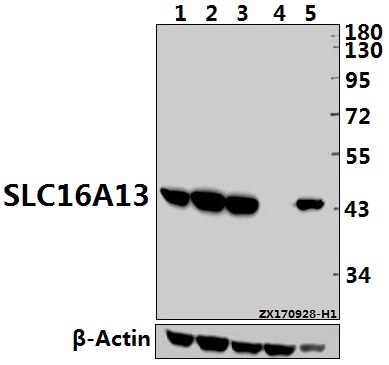Product Name :
SLC16A13 (L423) polyclonal antibody Background :
Monocarboxylates, such as lactate and pyruvate, play an integral role in cellular metabolism. Lactic acid is produced in large quantities as a result of glycolysis, which provides the majority of ATP to cells under normal physiological conditions. However, accumulation of lactic acid leads to a decrease in intracellular pH and, thus, to a cessation of glycolysis. In order for glycolysis to continue at a high rate, lactic acid must be transported out of the cell. This transport process is carried out by a family of monocarboxylate transporters (MCTs), which function as proton symports and are stereoselective for L-lactate. MCT13 (Monocarboxylate transporter 13), also known as SLC16A13 (Solute carrier family 16 member 13), is a 426 amino acid multi-pass membrane protein that belongs to the MCT transport family. Functioning as a proton-linked monocarboxylate transporter, MCT13 catalyzes the rapid transports of molecules, such as lactate, across the plasma membrane. Product :
Rabbit IgG, 1mg/ml in PBS with 0.02% sodium azide, 50% glycerol, pH7.2 Storage&Stability :
Store at 4°C short term. Aliquot and store at -20°C long term. Avoid freeze-thaw cycles. Specificity :
SLC16A13 (L423) polyclonal antibody detects endogenous levels of SLC16A13 protein. Immunogen :
Synthetic peptide, corresponding to amino acids 389-442 of Human SLC16A13. Conjugate :
Unconjugated Modification :
Unmodification
SLC16A13 (L423) polyclonal antibody Background :
Monocarboxylates, such as lactate and pyruvate, play an integral role in cellular metabolism. Lactic acid is produced in large quantities as a result of glycolysis, which provides the majority of ATP to cells under normal physiological conditions. However, accumulation of lactic acid leads to a decrease in intracellular pH and, thus, to a cessation of glycolysis. In order for glycolysis to continue at a high rate, lactic acid must be transported out of the cell. This transport process is carried out by a family of monocarboxylate transporters (MCTs), which function as proton symports and are stereoselective for L-lactate. MCT13 (Monocarboxylate transporter 13), also known as SLC16A13 (Solute carrier family 16 member 13), is a 426 amino acid multi-pass membrane protein that belongs to the MCT transport family. Functioning as a proton-linked monocarboxylate transporter, MCT13 catalyzes the rapid transports of molecules, such as lactate, across the plasma membrane. Product :
Rabbit IgG, 1mg/ml in PBS with 0.02% sodium azide, 50% glycerol, pH7.2 Storage&Stability :
Store at 4°C short term. Aliquot and store at -20°C long term. Avoid freeze-thaw cycles. Specificity :
SLC16A13 (L423) polyclonal antibody detects endogenous levels of SLC16A13 protein. Immunogen :
Synthetic peptide, corresponding to amino acids 389-442 of Human SLC16A13. Conjugate :
Unconjugated Modification :
Unmodification
-
 Western blot (WB) analysis of SLC16A13 (L423) pAb at 1:500 dilution Lane1:C6 whole cell lysate(40ug) Lane2:3T3-L1 whole cell lysate(40ug) Lane3:MCF-7 whole cell lysate(40ug) Lane4:HepG2 whole cell lysate(40ug) Lane5:H1792 whole cell lysate(20ug)
Western blot (WB) analysis of SLC16A13 (L423) pAb at 1:500 dilution Lane1:C6 whole cell lysate(40ug) Lane2:3T3-L1 whole cell lysate(40ug) Lane3:MCF-7 whole cell lysate(40ug) Lane4:HepG2 whole cell lysate(40ug) Lane5:H1792 whole cell lysate(20ug)
Bioworld Biotech only provide peptides for our antibodies and do not provide additional peptide customization services.
Price/Size :
USD 368/1mg/vial
Tips:
For phospho antibody, we provide phospho peptide(0.5mg) and non-phospho peptide(0.5mg).Describe :
Blocking peptides are peptides that bind specifically to the target antibody and block antibody binding. These peptide usually contains the epitope recognized by the antibody. Antibodies bound to the blocking peptide no longer bind to the epitope on the target protein. This mechanism is useful when non-specific binding is an issue, for example, in Western blotting (WB) and Immunohistochemistry (IHC). By comparing the staining from the blocked antibody versus the antibody alone, one can see which staining is specific; Specific binding will be absent from the western blot or IHC performed with the neutralized antibody.Formula:
Synthetic peptide was lyophilized with 100% acetonitrile and is supplied as a powder. Reconstitute with 0.1 ml DI water for a final concentration of 10 mg/ml.The purity is >90%,tested by HPLC and MS.
Storage:
The freeze-dried powder is more stable. For short time at 2-8°C. For long term storage store at -20°C.
Note :
This product is for research use only (RUO only). Not for use in diagnostic or therapeutic procedures.
 SLC16A13 (L423) polyclonal antibody
SLC16A13 (L423) polyclonal antibody  Datasheet
Datasheet COA
COA MSDS
MSDS SHIP
SHIP